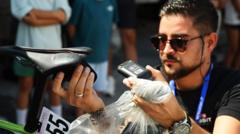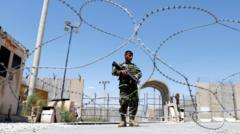Will All Riders at Road Worlds Be Required to Carry GPS Trackers?

Published: 2025-09-19 09:55:24 | Category: sport
The UCI's new GPS tracking system aims to enhance rider safety by allowing real-time monitoring of cyclists during competitions, starting at the upcoming Road World Championships in Rwanda. This initiative follows the tragic death of a young cyclist last year and seeks to prevent similar incidents by ensuring immediate assistance can be provided when needed.
Last updated: 21 October 2023 (BST)
Key Takeaways
- The UCI will implement GPS tracking for all riders at the Road World Championships.
- This decision comes after the tragic death of Muriel Furrer during the previous championships.
- The tracking system was tested at the Tour de Romandie Feminin, where five teams were disqualified for non-compliance.
- UCI President David Lappartient emphasised the necessity of this technology for rider safety.
- The championships will occur from 21-28 September in Kigali, Rwanda.
Background of the GPS Tracking System
The UCI, or Union Cycliste Internationale, is the world governing body for cycling, responsible for setting the rules and regulations for competitions at various levels. In recent years, safety has become a significant concern in cycling, particularly following accidents that have led to severe injuries or fatalities. The introduction of a GPS tracking system represents a proactive approach to addressing these concerns, ensuring that all riders can be monitored during races.
The Need for Enhanced Safety Measures
Safety in cycling events has come under scrutiny following several high-profile accidents. The tragic case of Muriel Furrer, an 18-year-old Swiss cyclist, highlighted the need for improved safety protocols. During the junior women's race at the last Road World Championships in Zurich, Furrer suffered a crash that left her unconscious for approximately an hour and a half. Organisers were unaware of her condition, underscoring the risks posed during competitions where riders can become isolated or incapacitated.
Testing the System: Tour de Romandie Feminin
The reliability of the GPS tracking system was put to the test during the Tour de Romandie Feminin, held in Switzerland last month. The UCI sought to evaluate the effectiveness of the under-saddle devices that would be used during the Road World Championships. However, the testing phase was not without controversy. Five teams were disqualified for failing to comply with regulations that required them to select a rider for the trial.
How the GPS Tracking System Works
The GPS tracking system enables real-time monitoring of each rider's position and speed. This information can be crucial for immediately identifying any unusual situations, such as a rider who suddenly stops on the course, potentially indicating a crash or medical emergency. By keeping track of all participants, race organisers can ensure prompt response times, which could save lives in critical situations.
Implications for Future Competitions
The introduction of GPS tracking at the Road World Championships is not just a one-off measure. It signifies a shift in how cycling events will be managed in the future. UCI President David Lappartient noted that this advancement is both "important and necessary." The long-term goal is to create a safer environment for cyclists, where technology plays a vital role in safeguarding their well-being.
Challenges Ahead
Despite the potential benefits of the GPS tracking system, there are challenges to its implementation. The UCI must ensure that all teams understand and comply with the new regulations. Additionally, the effectiveness of the system will depend on the infrastructure available at the event locations, particularly in regions like Kigali, Rwanda, where logistics and technology may vary.
What’s Next for Cyclists and Teams
As the Road World Championships approach, teams must adapt to the new requirements. This includes training riders on the use of the GPS devices and ensuring that they are familiar with the expectations during the competition. The success of the GPS tracking system will likely influence future cycling events, prompting other races to consider similar safety measures.
Conclusion: A New Era of Safety in Cycling
The UCI's implementation of the GPS tracking system marks a significant progression in cycling safety protocols. By prioritising the well-being of riders, the governing body is taking a crucial step towards preventing accidents and ensuring that immediate assistance is available when needed. As the cycling community gears up for the championships in Rwanda, the hope is that this technology will pave the way for a safer future in the sport.
FAQs
What is the purpose of the UCI's GPS tracking system?
The UCI's GPS tracking system aims to enhance rider safety by providing real-time monitoring of cyclists' positions and speeds during races, allowing for immediate assistance in emergencies.
When will the GPS tracking system be used?
The GPS tracking system will be used for the first time at the Road World Championships, scheduled to take place from 21-28 September in Kigali, Rwanda.
Why was the GPS tracking system introduced?
The system was introduced following the tragic death of Muriel Furrer, highlighting the need for improved safety measures to protect cyclists during races.
What happened during the testing phase at the Tour de Romandie Feminin?
During testing, five teams were disqualified for failing to comply with the requirement to select a rider to test the GPS tracking devices, raising issues of compliance within the sport.
How does the GPS tracking system work?
The system uses under-saddle devices to track the position and speed of each rider in real-time, enabling race organisers to respond quickly to any unusual situations, such as a cyclist who has stopped on the course.
The implementation of the UCI's GPS tracking system marks a pivotal moment in cycling safety. As the sport evolves, the focus on rider welfare will undoubtedly become a central theme for future competitions. How will this technology shape the future of cycling? #CyclingSafety #UCI #RoadWorldChampionships



